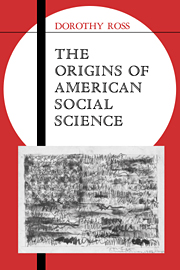Book contents
- Frontmatter
- Contents
- Acknowledgments
- Abbreviations used in the footnotes
- Introduction
- Part I European social science in antebellum America
- Part II The crisis of American exceptionalism, 1865–1896
- Part III Progressive social science, 1896–1914
- Part IV American social science as the study of natural process, 1908–1929
- 9 New models of American liberal change
- 10 Scientism
- Epilogue
- Bibliographical note
- Indexes
- Ideas in Context
9 - New models of American liberal change
Published online by Cambridge University Press: 23 September 2009
- Frontmatter
- Contents
- Acknowledgments
- Abbreviations used in the footnotes
- Introduction
- Part I European social science in antebellum America
- Part II The crisis of American exceptionalism, 1865–1896
- Part III Progressive social science, 1896–1914
- Part IV American social science as the study of natural process, 1908–1929
- 9 New models of American liberal change
- 10 Scientism
- Epilogue
- Bibliographical note
- Indexes
- Ideas in Context
Summary
During the second decade of the new century, as progressivism advanced and collapsed into worldwide conflagration, a number of social scientists responded more profoundly than their contemporaries to the currents set in motion by the crisis of American exceptionalism. Imagining themselves in a wholly new world, they looked for the Utopian shape of modernity within the process of liberal change itself. The concepts and paradigms they developed are still among the most fundamental and characteristic of twentieth-century American social science, among them Robert F. Hoxie's and Wesley Clair Mitchell's institutional economics, William I. Thomas' and Robert Park's urban social research, and Arthur F. Bentley and Charles Beard's group politics. Beginning with Bentley's The Process of Government in 1908, these new programs were intended to grasp the character of liberal historical change. Yet framed as sciences of natural process, they often abandoned historical context, structure, and time. In this chapter we will examine this innovative cohort and the bearings of their new work; in Chapter 10 we will take a broader look at how the balance shifted toward scientism in the social disciplines.
The historical context of natural process
This late Progressive cohort was not entirely defined by age. Although many were younger, born in the 1870s and a few fast-starters in the 1880s, others were no younger than the more conventional Progressives. Thomas and Park, like Edward A. Ross and Charles H. Cooley, were born in the mid-1860s.
- Type
- Chapter
- Information
- The Origins of American Social Science , pp. 303 - 389Publisher: Cambridge University PressPrint publication year: 1990

